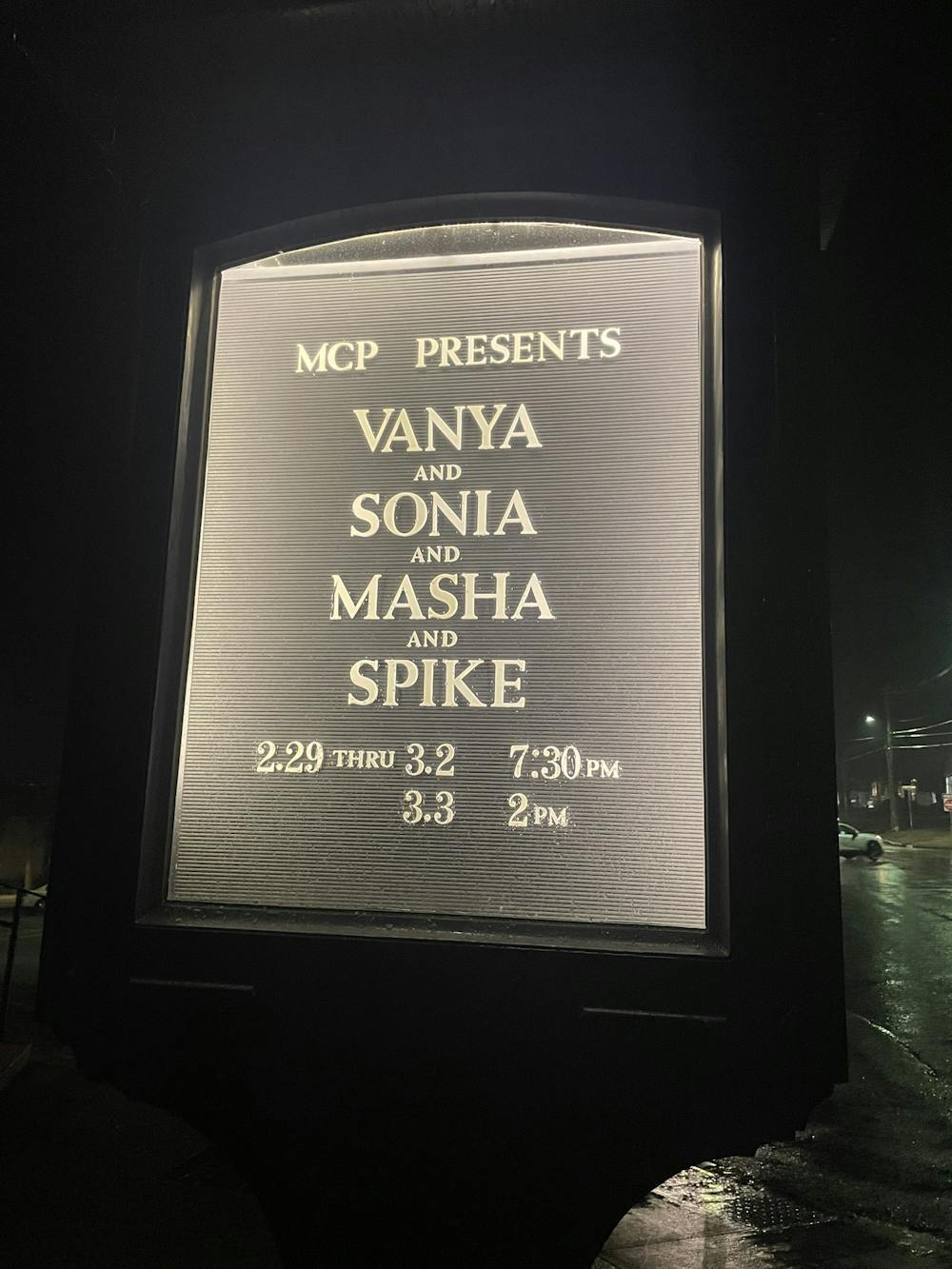To ring in the spring, the Middlebury Community Players (MCP) turned to “Vanya and Sonia and Masha and Spike,” an offbeat countryside comedy by Christopher Durang. The show ran from Thursday, Feb. 29 through Sunday, March 3 at Town Hall Theater. Since its founding in 1959, MCP has typically staged between two and four performances per year.
“MCP always presents a comedy in its winter slot,” wrote Peter Kristoph ’76, the show’s director, in an email to The Campus. “I tossed around various comedies to propose before deciding on [“Vanya and Sonia and Masha and Spike”], which struck me as funny yet substantive. In other words, it wasn’t just a frivolous comedy — an observation boosted by the fact the play won the Best Play Tony Award in 2013 on Broadway.”
“Vanya and Sonia and Masha and Spike” is the fourth production that Kristoph has directed for MCP. It was produced by Jon Fenner and stage managed by Tom Noble. Following open auditions in December, Kristoph cast six actors, two of whom are MCP contributing members, from a pool of 17 local auditioners.
The plot centers on a refreshingly dysfunctional family made up of three siblings in their sixties: the curmudgeonly Vanya (Kevin Commins), the narcissistic actress Masha (Annie Moore-Cox) and the perpetually disappointed Sonia (Kimberlee Moyer), their adopted sister. The trio’s names are taken from Anton Chekhov’s work, but regardless of familiarity with the playwright, the tension between theatrical and family drama is clear.
Act I opens with Vanya and Sonia’s morning routine — squabbling over coffee — which is interrupted when Masha arrives with her 20-something-year-old fifth husband, Spike (Kush Sharma). Old tensions (who pays the bills?) and new rivalries (who is the pretty young neighbor?) reach their peak on the evening of a costume party.
In Act II, the siblings let down their guard as the sisters fight openly, romances abruptly spark and flame out, and the group ponders changing times. When the curtain falls, the setting remains unchanged. The projected sun rose, set and rose again — all alterations occurring beneath the skin.
In many ways, the set was one of the main characters of the play. Described in the program as the “patio of a farmhouse in Bucks County, Pennsylvania,” MCP’s version featured an ivy-covered gazebo, cushy deck furniture and forest imagery depicted in a series of brightly colored impressionistic panels by scenic painter Jessica Danyow.
While the show’s lighting and sound design were simple, letting the actors and the script stand for themselves, the performance incorporated fun and hummable songs like “Good Morning” from the musical “Singing in the Rain” and “Heigh Ho” from Walt Disney’s “Snow White.” The use of music dressed up the single set and provided effective transitions between scenes.
On the theme of dressing up, the costumes were highlights of the show. From Masha’s entrance in a dramatic red floral dress, strappy heels and sunglasses to Sonia’s turquoise turn as the evil queen à la Maggie Smith in “California Suite,” costume designer Connie Carroll breathed life into each of the characters.
In particular, Sonia’s personal transformation was reflected in her costuming, as she goes from a hardened homebody in slippers and a robe to a woman ready to claim her place in the world, having literally let down her hair. More abstractly, Carroll’s sparkly imagining of a molecule was another standout ensemble.
Of all the strong moments of acting in the play — among them Sonia and Masha’s battle to be the most pitiful crier, Vanya’s Morticia-worthy deadpan and Spike’s we’re-laughing-at-you comic relief — Vanya’s eleventh-hour monologue must be mentioned. Kristoph cited the four pages of text as one of the moments he connects with most from the script.
“I could relate to his memories of TV from the late 1950s and early 1960s, along with typewriters, Wite-out, carbon paper and dial telephones! Many audience members ‘of a certain age’ have come up to me after seeing the play elated to have ‘gone down memory lane’ with Vanya during his monologue,” he wrote in an email to The Campus.
For younger attendees, however, the play’s nostalgia for the ’50s is a bit more complicated.
“With his vision turned towards the past, the playwright delivers through Vanya’s lines a rather curious yearning — oh mankind doomed with the imminent global apocalypse, why can’t we just go back to the good old times, when we can still do one thing at a time?! But the truth is, there are no ‘good old times,’” attendee Caroline Jiao ’24 wrote in a message to The Campus.
Even the character herself feels the need to make a disclaimer: “I’m not a conservative but I love things from the past,” says Vanya.
Beyond the content of the play itself, what is most striking about the performance is the way it showcases the continued strength of community theater in the Middlebury region. Though the house wasn’t full on Saturday evening, several recent MCP productions have stood out for their creative audacity, as reflected in packed seats and sold out signs. For example, in the fall of 2023, “Second Sight” offered a spooky reimagining of the lives of the Eddy Brothers complete with magic and messages from beyond the grave, while the spring 2022 production of the musical “Tuck Everlasting” captured hearts with its earnest illustration of the immortal Tuck family and their entourage.
Despite a few issues of pacing likely owing more to an untrimmed script than to the actors’ delivery, “Vanya and Sonia and Masha and Spike” fits into the strong tradition of local theater in Middlebury.
“I hope that audiences are happy they made the effort to go out in late February/early March to be entertained by live theater and that [the show] made them laugh — and perhaps shed a tear or two,” Kristoph wrote.
“There are no shared memories anymore,” Vanya protests in his monologue. But what is live theater if not a shared memory?
Reflecting on Richard Burton and Julia Andrews’ performance on “The Ed Sullivan Show,” Vanya mourns, “it put theatre in the national consciousness, which it isn’t anymore.” Community theatre productions like MCP’s “Vanya and Sonia and Masha and Spike” are challenging that idea.

Acadia Klepeis ’24 (she/her) is an Arts & Culture Editor.
She is an English major and a French and Francophone Studies minor. Last year, Cadi studied literature in Paris and in Oxford through Middlebury’s school abroad programs. She spent this past summer working as a communications intern for the Vermont Arts Council. Previously, she completed internships with Tuttle Publishing, Theatre in Paris, and Town Hall Theater. Cadi is also on the board for Middlebury College Musical Theatre.




